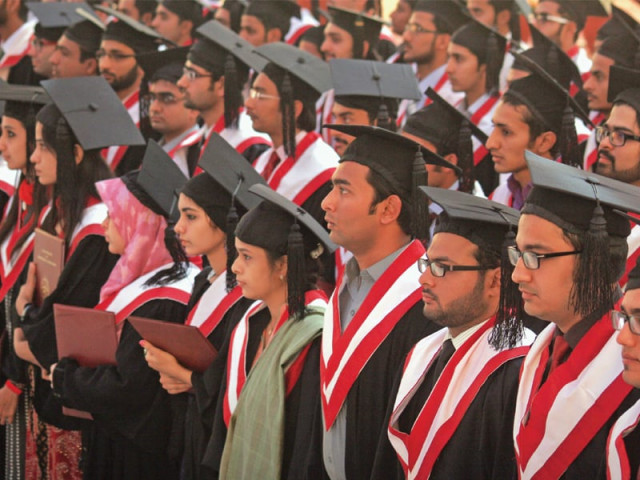Graduation day at NED: Engineers of the future say goodbye to their past
Vice-chancellor Engineer Abul Kalam presides over the 21st convocation of the university.

Students waiting to receive their degrees on the 21st convocation of NED University on Thursday. PHOTO: ATHAR KHAN/EXPRESS
The country’s longest serving vice-chancellor among public sector universities, 90-year-old Engineer Abul Kalam, presided over the 21st convocation of the university, which was also the last of his impressive 16-year feat. Sindh Finance Minister Murad Ali Shah was the chief guest at the event.
Around 1,289 students were awarded Bachelor’s degree in 20 disciplines of engineering and technology while 127 earned their Master’s degree from 15 postgraduate programmes. Two doctorate degrees were also given to Dr Arjumend Masood (civil engineering) and Dr Sadia Muniza Faraz (electronic engineering) at the ceremony.
When announced that students could get their picture taken with the vice-chancellor at the end of the ceremony, a sea of graduating students made sure they didn’t miss the opportunity.
With the confident flair of professionals in their field, Ammarah Adnan along with Asad Ahmed Ansari - two position-holders in the telecommunication engineering and already employed by the leading telecommunication companies - recalled their four-year relationship with the university as an exclusive experience. “Each of us studying in 20 diverse disciplines of engineering and technology shared an exclusivity that comes with getting admission into the NED University.”
While a large number of the graduating students had already secured jobs with government and private, national and multinational organisations, those awaiting employment were also confident of their skills and were eager to get involved in hands-on operations.
“It isn’t that we are not capable enough -there are limited investments and projects in our particular filed presumably due to uncertainty, leading to the downtrend in job market,” said Hira Syed, who graduated in metallurgical engineering with second position. “Around 80 per cent of the 53 students in my field are still looking for jobs,” said Saquib Hesham, another metallurgy graduate while talking to The Express Tribune.
This scenario for students of some disciplines, including materials engineering and textile engineering, was diametrical to the status of those students who had studied petroleum, electrical, chemical or telecommunication engineering. For instance, Ammarah Adnan expected a further upsurge in job opportunities for telecommunication engineers with the licences of 3G (third generation) technology. “Telecommunication companies are very eager to adopt the technology in their businesses and have even acquired the required infrastructure.”
Hafiz Muhammad Zubair Kabir, who stood first in civil engineering and bagged three gold medals, said that the graduates of the “mother engineering disciplines” of civil, electrical and mechanical, were usually more fortunate during the downtrends as they can also fit into sub-disciplines like electronics, computer and information systems, electronic engineering or others
Published in The Express Tribune, March 1st, 2013.



















COMMENTS
Comments are moderated and generally will be posted if they are on-topic and not abusive.
For more information, please see our Comments FAQ